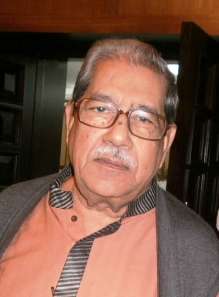Anisuzzaman
| Anisuzzaman আনিসুজ্জামান | |
|---|---|
 | |
| Born |
18 February 1937 Calcutta, Bengal Presidency, British India |
| Occupation | Activist, author |
| Language | Bengali, English |
| Nationality | Bangladeshi |
| Period | 1956–present |
| Subject | Bengali literature |
| Notable awards |
Bangla Academy Award Ekushey Padak Padma Bhushan Independence Day Award |
| Relatives | Sheikh Abdur Rahim (Paternal Grandfather) |
Anisuzzaman (born 18 February 1937)[1] is a Bangladeshi academic of Bengali literature.
Education
Anisuzzaman was a Post-doctoral Fellow at the University of Chicago during 1964–65 and a Commonwealth Academic Staff Fellow at the University of London during 1974–75.
Career
Anisuzzaman was a professor of Bengali at the University of Dhaka. Presently, he is professor emeritus in the same department.[2] He has received the Bangla Academy Award and the Ananda Purashkar for his work in the field of Bengali literature.[3] In 2011 he received the Pandit Iswarchandra Vidyasagar Gold Plaque from the Asiatic Society of Kolkata.[4]
Resume
Born in Kolkata in 1937, Anisuzzaman had a distinguished academic career at the University of Dhaka, obtaining his BA (with honours in Bengali, 1956), MA (1957) and PhD (1962) degrees. He was a post-doctoral fellow at the University of Chicago (1964–65) and a Commonwealth Academic Staff fellow at the University of London (1974–75). From 1978 to 1983 he was associated with research projects of the United Nations University. He was a visiting fellow at the University of Paris (1994), North Carolina State University (1995) and University of Calcutta (2010), and a visiting professor at the Visva-Bharati (2008–09, 2011). Having taught at the Universities of Dhaka (1959–69, 1985–2003, 2005–08) and Chittagong (1969–85), he is currently a professor emeritus at the University of Dhaka.
Anisuzzaman's publications include Muslim-manas O Bangla Sahitya (Dhaka, 1964), Swaruper Sandhane (Dhaka, 1976), Purono Bangla Gadya (Dhaka, 1984), Bangali Nari: Sahitye O Samaje (Dhaka, 2000), Kal Nirabadhi (Dhaka, 2003) and Ihajagatikata O Anyanya (Kolkata, 2012); Factory Correspondence and other Bengali Documents in the India Office Library and Records (London, 1981), Creativity, Reality and Identity (Dhaka, 1993), Cultural Pluralism (Kolkata, 1993) and Identity, Religion and Recent History (Kolkata, 1994). Notable among his edited works are Rabindranath (Dhaka, 1968), Sardhashatavarshe Rabindranath (Kolkata, 2012), Bangla Sahityer Itihas, vols. I & II (with others, Dhaka, 1987 & 2008), and Culture and Thought (with Anouar Abdel-Malek, London, 1983).
He has received many honours including the Nilkanta Sarkar Gold Medal from the University of Dhaka, Dawood Prize for literature from the Pakistan Writers’ Guild, Bangla Academy award for research, and Ekushe Padak, bestowed by the State for his contribution to education. He has also received Ananda Puraskar from the Ananda Group of Publications, Kolkata, an honorary D. Lit. by the Rabindra-Bharati University, Kolkata, Sarojini Basu Medal by the University of Calcutta and Pandit Iswarchandra Vidyasagar Gold Plaque and Rabindranath Tagore Birth Centenary plaque from the Asiatic Society, Kolkata. In 2014, the government of India conferred the Padma Bhushan, third highest civilian honour, on him; the first such award for any Bangladeshi. On 4 March 2015, he received the Independence Award — the highest civilian honour in Bangladesh.
Anisuzzaman was a member of the Planning Commission to the Government of Bangladesh during the Bangladesh liberation war and a member of the National Education Commission set up by the government after liberation. He was responsible for the Bengali language part of the Constitution of Bangladesh adopted in 1972. He served as Chairman of the Trustee Board of the Nazrul Institute and is currently the President of the Bangla Academy.
Anisuzzaman actively participated in all the progressive movements the country has ever witnessed. He had notable contribution in the Language Movement (1952), participated in Mass Uprising (1969), taken part in the War of Liberation (1971) and was the Secretary of Bangladesh Teachers’ Association in 1971. Anisuzzaman was involved in the anti-autocracy movement (1990), a plaintiff at the symbolic public trial of a war criminal and was a prosecution witness at the International Crimes’ Tribunal set up to try those accused of perpetrating crimes against humanity during the Bangladesh Liberation War.
Literary works
- Muslim Manos O Bangla Sahitya (মুসলিম মানস ও বাংলা সাহিত্য) (1964)
- Munir Chowdhury (মুনীর চৌধুরী) (1975)
- Swaruper Sandhane (স্বরূপের সন্ধানে) (1976)
- Purono Bangla Gadya (পুরোনো বাংলা গদ্য) (1984)
- Aamar Ekattor (আমার একাত্তর) (1997)
- Muktijudho Ebong Tarpor (মুক্তিযুদ্ধ এবং তারপর) (1998)
- Aamar Chokh (আমার চোখে) (1999)
- Kaal Nirobodhi (কাল নিরবধি) (2003)
- Factory correspondence and other Bengali Documents in the India office Library and Records (1981)
- Creativity, Identity and Reality (1991)
- Cultural Pluralism (1993)
- Identity, Religion and Recent history (1995)
Awards
- Bangla Academy Award for research (1970)
- Ekushey Padak, an award given by the State, for his contribution to education (1985)
- Ananda Puraskar, (1993)
- Honorary D.Lit, Rabindra Bharati University, Calcutta (2005)
- Sarojini Basu Medal, University of Calcutta (2008)
- The Pandit Iswarchandra Vidyasagar Gold Plaque, Asiatic Society of Kolkata (2011)
- Padma Bhushan, On contribution of Literature and Education (2014)[5]
- Independence Day Award for literature
References
- ↑ http://news.priyo.com/music/2012/02/19/dr-anisuzzaman-honoured-his-75-46906.html
- ↑ "Essential Tagore", Daily Star, Bangladesh: Mediastar, 16 May 2011, retrieved 10 June 2011
- ↑ Majumdar, Pinaki (28 December 2004), "Tie-up Boost to Bangla Literature", The Telegraph, Kolcata: ABP Limited, retrieved 10 June 2011
- ↑ "Dr Anisuzzaman Honoured", Daily Star, Bangladesh: Mediastar, 4 May 2011, retrieved 10 June 2011
- ↑ "Full List of Padma Awards". Retrieved 25 January 2014.